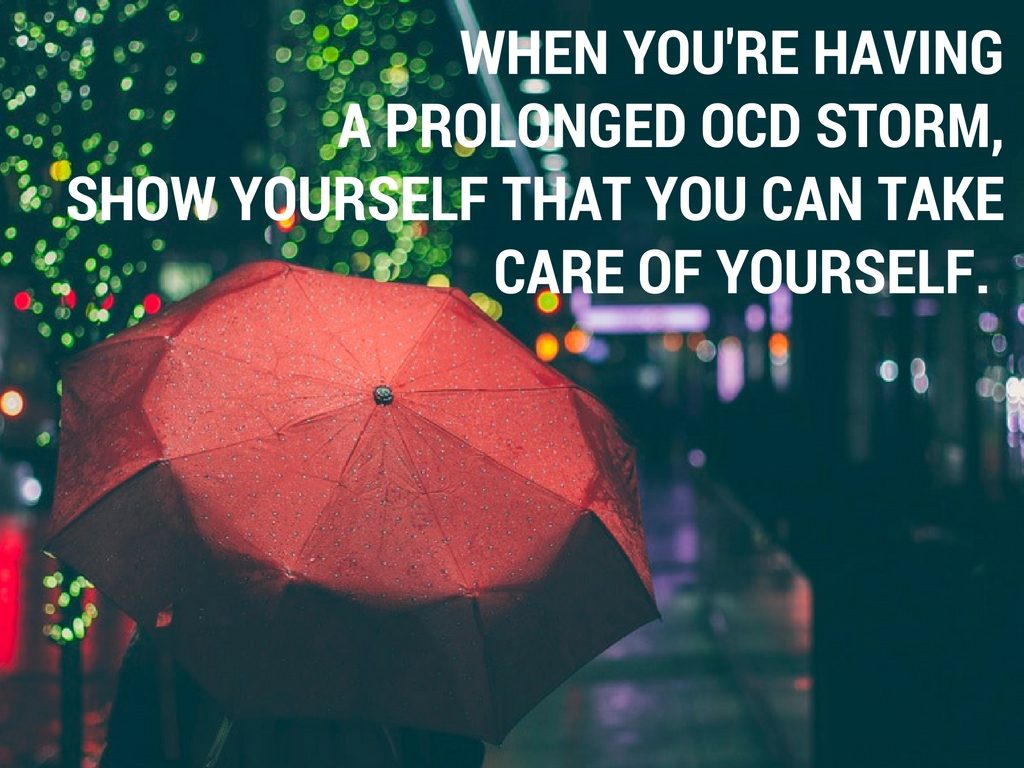Often, young people who have just been diagnosed with OCD—or are dealing with a flare-up—”go home again” and move in with family to regroup. My strong opinion is that this isn’t a good idea. Going home again can often undo the progress that you’ve made in your life, such as having a good job, having a nice apartment, having a social circle. When you go home again, you risk dismantling your life. More crucially, going home again usually allows OCD to fester.
Instead of going home again, plant your feet in your life and take advantage of every support system around you. Here’s how you stay:
Brush up on OCD basics.
When you’re having a prolonged tussle with OCD, make sure you have what you need in your toolbox. Remember mantras like, “Okay, so I’m having that thought” and “I’m just gonna ride it out.”
Tell your boss.
Please don’t leave your job. Instead, have a conversation with your boss about what’s going on and that you may need time to go to doctor’s appointments. You can say you’re struggling with a health problem (that’s true—it’s just your brain wiring misfiring) and it’s personal. Legally, your boss can’t ask, “What is it?” If she persists and you don’t want to tell her, you can say, “I’m struggling with a common mental health issue and I’m getting help. I would appreciate having some flexibility in my schedule in the coming months.” Propose strategies you’d like to put into place so you can keep working while you work on you.
Make this point first: “I care about my career, I care about the company’s success, and I care about growing with the company. But right now, I can’t give 130%. I need to slow down for two months while I take care of my health.” Then, you can propose solutions such as, “I’d like to have a hard stop at 5pm two days a week” or “I would like to establish that I’m not accessible by email after hours.”
Your boss probably really likes you. Or at the very least, your boss wants to keep you. Replacing employees, or figuring out staffing needs while an employee takes medical leave, is an extremely expensive aspect of running a business. It’s likely that your boss will want to work with you on this.
If you’re scared of this conversation, don’t be. If you were considering “going home again,” that means you were probably considering leaving your job anyway! So, say what you need to say. Also, tell your boss that you want to have an open dialogue: encourage her to tell you if she senses your performance is flagging at any point, so you’re aware of it, and so you can make adjustments. (Then you don’t have to worry about it. If there’s a problem with your performance, someone will tell you).
Reframe the way you think about work.
It’s also important to stay at your job because work provides a place to refocus and practice your OCD coping skills. When you feel your OCD flaring up, you can say to yourself, “I have OCD. I have some thoughts or sensations that I find really uncomfortable or frightening. I’ll just nod at these thoughts and acknowledge them. Then I’m going to focus on work, and focus on doing my best, and nod at the thoughts whenever they pop up again.”
Tell your roommates.
Frequently, OCD thoughts and fears revolve around the home: fear of leaving the water running, fear of someone messing with the way the contents of your room (or the refrigerator) are perfectly arranged, fear of not flushing the toilet, etc. You could even be struggling with irrational, looping thoughts about your roommates “catching you” performing a ritual or acting strangely.
Here’s how to get in front of the story: tell your roommates. You can make it super casual: “Just so you know, I’m really struggling with anxiety. So if you see me acting odd, or if I seem distressed, that’s why. I wanted to tell you, so you know that I’m getting help, and also so you don’t think I’m losing it.”
Then, it’s out in the open, and you can make your home your sanctuary
Create a sanctuary.
Find a place where you can be fully, completely comfortable. An easy option is your bedroom (especially if you have your own room). Buy a few things to make this space comfortable, like a soft blanket, attractive art for the walls, or a new pillow. Consider other places where you can easily go to feel safe. Make a list of places that can be your “happy place.” This could be your favorite grassy spot in the park, your favorite chair in your local coffee shop, your favorite elliptical at the gym, or your favorite nook in the library or the bookstore. When you feel like curling up into a frightened, anxious ball, know there’s a place where you can safely uncurl and spread out, cuing your brain into feeling totally at ease.
Whatever you do, just keep living your life. When your OCD flares up, instead of dismantling your life, focus on building your life. Instead of taking shelter, show yourself that you have the strength to handle the storm.










